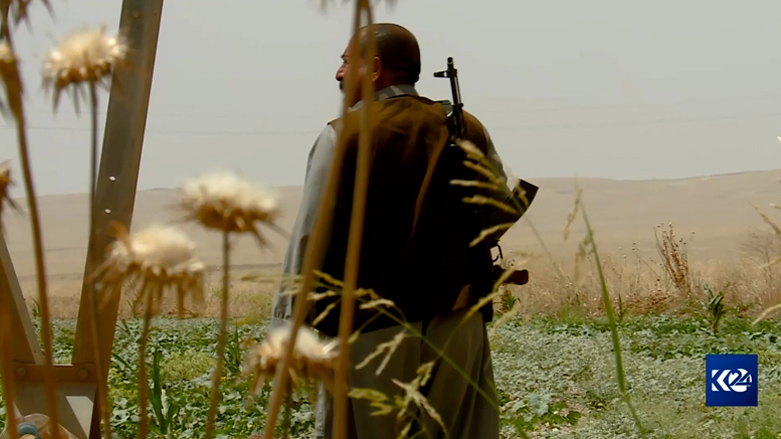Fending off threats from resettled Arabs and ISIS, Kurdish villagers take up arms in Kirkuk
The main goal of Saddam Hussein, the executed Iraqi despot, was to change the demography of the oil-rich province, which the Kurds have claimed for decades.

ERBIL (Kurdistan 24) – Increased insecurity triggered by the frequent attacks from resettled Arabs and ISIS remnants in Kirkuk have forced Kurdish villagers to take up arms to fend off what they call their “ancestors’ land”.
Carrying his AK-47 rifle, Adalat Habib, a Kurdish villager in southern Kirkuk’s Bawa village, patrol his agricultural land regularly as the area’s residents have faced renewed threats from reselected Arabs and ISIS extremists.
“It is my ancestors’ land. My 10th great-grandparents have been buried alive in defense of it,” Habib, who lost a hand in a mine explosion, told Kurdistan 24 on Monday.

Backed by Iraqi forces and Kirkuk’s acting Governor Rakan Jabouri, resettled Arabs, particularly following the withdrawal of Kurdish Peshmerga forces in 2017, have upped their attacks and harassment against Kurdish villagers.
In a campaign dubbed Arabization, the former Iraqi Ba’athist regime in the 1970s and 1980s displaced thousands of indigenous Kurds and Turkomen in Kirkuk and its surrounding areas and replaced them with Arab nomads, coming from other parts of the country.
The main goal of Saddam Hussein, the executed Iraqi despot, was to change the demography of the oil-rich province, which the Kurds have claimed for decades.
Bolstered by Saddam-era ownership documents, the resettled Arabs eye reclaiming 18,000 dunams (1,800 hectares) of Kurdish lands in the area. To refute the Arab migrants’ claims, the rural Kurds firmly rely on the Ottoman Empire-issued ownership certificates.
Following the US invasion of Iraq in 2003, the Kurdish parties fought hard to include a clause in the new constitution to reverse the systemic ethnic cleansing by demanding the “normalization” of these areas through a compensation scheme for the resettled Arabs.
Each resettled family has received about 20 million Iraqi dinars (about $16,000 by the 2007 exchange rate) to move back to their places of origin.
“Our people are at risk. We have no security and our shepherds are abducted,” Shamal Sheikh Hussain, a resident of Bawa village, told Kurdistan 24.
ISIS makes a comeback
Despite the territorial defeat of ISIS in 2017, the remnants of the so-called Islamic State regularly target villagers and members of the security forces.
In an attack on an army outpost in northern Kirkuk on Saturday overnight, at least two Iraqi officers were killed and three others were wounded in a suspected ISIS attack.
A number of Kurdish shepherds were abducted last year in both Kirkuk and Tuz Khurmatu for ransom.

The extremist group has similarly targeted villagers and shepherds in the village, forcing the rural population to take up arms to defend themselves.
“We guarded our crops for 45 nights until the harvesting finished,” Habib said.
Several arson acts in previous years during the harvest season were blamed on the members of the terror group.
The ongoing security threats have shrunk the village’s population significantly, reducing it to only 70 families. Nearly 600 families used to dwell in the area.
Bawa and several other villages in the province lie in the so-called “security vacuum” between the Iraqi and Kurdistan Region forces that had been exploited by ISIS.
Additional reporting by Kurdistan 24 Kirkuk reporter Hemin Dalo